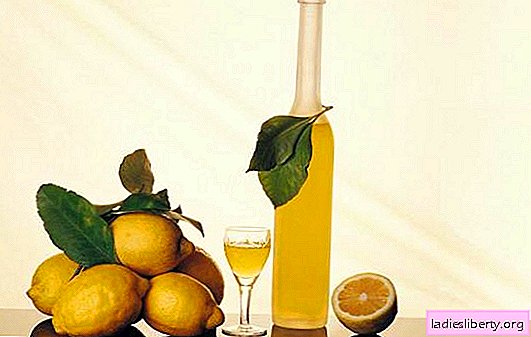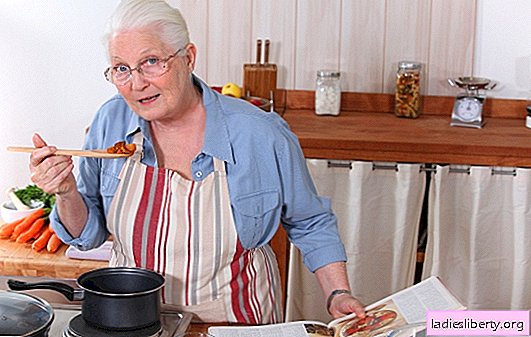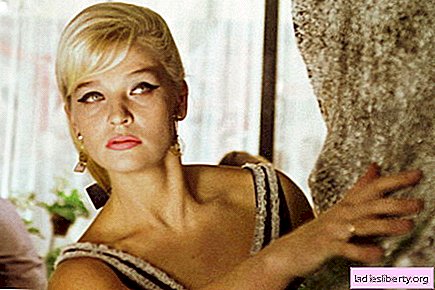
Before tinctures became an attribute of a feast, they were invented exclusively as a medicine, since herbal infusions (on water) have shorter shelf life.
In addition, it is precisely because of the alcohol content in the tinctures that the beneficial elements of herbs, fruits and spices are much faster and are more fully absorbed by the body.
Lemon tincture - the basic technological principles
Speaking about the secrets of making homemade tinctures, let us begin with the main technological principles for a general understanding of the preparation process and the classification of all types of tinctures. By the way, this understanding will allow you to move on to improvisation, and maybe help you come up with your own unique recipe that will delight friends and neighbors in the country at the holiday table.
All tinctures, including balms, liquors and liquors, which are subspecies of fruit, berry, herbal or spicy extract (tinctures), have sugar and alcohol content classification. Although in home cooking these indicators are not controlled by GOST, it must be borne in mind that the taste of the finished product, its strength and, finally, the quality, which is directly related to the shelf life, ultimately depend on the percentage of sugar and alcohol.
The range of drinks containing zest, juice, alcoholic extract or lemon essential oil ranges from low alcohol alcoholic juices, with a strength of 6-12%, to balsams containing 30 to 45% alcohol and bitter tinctures (30-60%).
According to the sugar content in lemon tincture, it can be bitter, sweet or semi-sweet.
Tincture may contain 18-30% sugar. A higher percentage (up to 40%) translates lemon tincture into another subtype of alcoholic beverages - liqueurs, which are based on the technology of extracting juice-containing products. And finally, tinctures with sugars or sweeteners up to 50% are a liquor group.
As can be seen from these figures, the range of lemon tincture on the content of alcohol and sugar can be significantly expanded only through these two indicators.
Of course, the main ingredient in lemon tincture is exotic citrus, which has become such a familiar product that its East Asian origin is rarely recalled. But its aroma is so distinct that the presence of lemon in any product immediately becomes noticeable.
The classic lemon tincture is made from the zest of the fruit, because it decorates the drink, passing the essential oils contained in it to the alcohol base.
The basic recipe for lemon tincture
¾ Fill any peeled container tightly with the peel removed. Add ethyl alcohol (96%) to completely cover the feed. Extraction process can speed up significantly, if the zest is preliminarily held for at least half an hour in the freezer and then crushed thoroughly. Insisting the product is best done, on the contrary, in the warmest conditions. It must be remembered that under the influence of light changes the color of the tincture, and get a bright lemon tint will fail. Therefore, stock up on a bottle or jar of dark glass and keep this dish in the kitchen cupboard. Do not forget shake tank for one and a half to two months, at least once every two to three days.
The main lemon tincture can be prepared in any season, due to the availability of ingredients. If only lemon juice is needed for cooking, then the zest can be removed and put in the freezer before it is picked up for the next portion of lemon tincture.
Ready semi-finished product useful at any time, not only for making drinks, but also as a perfume for baking and desserts.
The same workpiece can be made based on cognac. But it must be remembered that its strength reaches only 45%, so the tincture will be less strong and the extraction will take about two times longer.
To prepare the basic lemon tincture, sweet, you need to add to the base extract 30% water based sugar syrup.
To get the desired strength of the tincture it will be very convenient to use an alcohol meter and bring the alcohol content to the desired value, with purified water or concentrated juice. After dilution of the alcohol base, ready-made lemon tincture leave for aging, at least a week, to improve the taste.
Tinctures can be prepared in another way, mixing all the ingredients at the same time and sending them for exposure.
Given the universal combination of lemon with many products used both for preparing drinks and for dishes that can be decorated with a lemon aperitif, we will briefly dwell on the compatibility of spicy ingredients in lemon tincture.
From fruit lemon supplement:
Oranges and all citrus;
Almost all dried and fresh berries;
Apricots;
Bananas;
Pears
Cherries;
Peaches;
Mango;
Melon;
Persimmon.
In addition, lemon essential oil blends beautifully dried fruits and nutsespecially almonds. Very fit cream, coffee, chocolate, milk, different types of honey.
Of spicy flavors most combined with citrus notes vanilla, cinnamon, cardamom, anise, juniper coniferous aroma, ginger.
For lemon tincture can serve as a great addition mint, chamomile, tea rose petals, rowan berries and bark, lemon balm, green pine cones, bergamot, jasmine flowers, linden.
By the way, the basis can serve not only ethyl alcohol or vodka, but also rum, cognac, whiskey, gin, calvados and any strong alcoholic beverages.
This list of additional ingredients can be significantly expanded, but the above is more than enough to create an assortment for every taste in the home bar.
All recipes tinctures can be considered "democratic" - they do not require strict adherence to the composition and proportions. From the suggestions below, you can choose any recipe, supplement it or, conversely, remove the component, according to personal preference.
Recipe 1. Lemon Tincture "Cardinal", strong, semi-sweet
Composition:
Jasmine, dried flowers - 3 tbsp. spoons
Lemon zest - 50 g (fresh lemons)
Chamomile, pharmacy (flowers) - 2-3 table. spoons
Caramelized sugar syrup - 180 g (for blending)
Vodka (40%) - 500 ml
Ethyl alcohol - 200ml
Water 250 ml
Cooking:
Place fresh lemon peel, chamomile and jasmine flowers in a gauze package and, putting them on the bottom of a suitable container, pour ethanol.
The extraction process in alcohol is faster than in alcohol with a lower concentration of alcohol. Therefore, after 72 hours you will receive a completely full extract. To enhance the effect, you can warm it up to 60 degrees in a closed can. Chamomile flowers will give a slight astringency to the tincture, as well as color it in a pleasant golden color. Dilute the finished syrup with a characteristic caramel smell and taste with chilled boiled water, pour vodka into the same dish first, and then the extract obtained, previously passed through a multilayer filter. It is better to insist the product at room temperature and in a tightly sealed container.
Recipe 2. Lemon tincture "Russian", strong
Composition:
Cognac - 0.7
One large lemon
Sugar 0.5 cup
Cooking:
In European countries, it is believed that lemon has too rich aroma and therefore it does not combine with cognac. However, since the time of Nikolaev in Russia, it was lemon that became the best addition to the exquisite cognac aroma. An unknown cook at the court of Nicholas II served the emperor with a lemon and sugar as a snack, which the latter was pleased with.
Peel the zest from the lemon, cut it in half, squeeze the juice. Combine sugar with juice and heat to dissolve. The resulting syrup is poured into cognac and toss the lemon zest removed from the lemon. Close the jar and put it in a warm place. After a week you can try the tincture.
It can also be used to soak biscuits or in the preparation of creams and desserts.
Recipe 3. Lemon tincture "Love Potion"
The truth is that the following composition, in combination with lemon and alcohol, actually stimulates the reproductive system, while helping to combat stress and fatigue. All ingredients are quite affordable "magic tools".
Raw material:
5 oranges
Hawthorn tincture 75 ml
2 lemons
100 g almonds
Turmeric 30g
Vodka 2.5 liters
Honey, liquid 500 g
Cooking:
Peel the citrus. All the spicy ingredients chop and pour vodka, combined with hawthorn extract, citrus juice and honey. Not less than 10 days, you can filter the finished tincture.
Recipe 4. Lemon Tincture, Bitter
Composition:
Lemon
Wine alcohol (50%) 1 l
Coriander (seeds)
Nutmeg (nut)
Mint
Cooking method:
Cut the lemon into slices, pour the alcohol solution with the peel and spices added. To sustain at a temperature not lower than 18оС up to one month. Squeeze the fruit, carefully filter and pour into bottles.
Recipe 5. Lemon tincture with bananas and strawberries
Such a fruit and berry combination has long been considered a classic. In fact, sweet tinctures are liquors, and the technology for their preparation differs only in a slightly higher sugar content in liquor drinks.
Raw material:
Lemon tincture, bitter (60%) - 0.5 L (basic recipe)
Bananas - 500 - 600 g
Sugar -1.3 kg
Strawberries - 0.5 - 0.6 kg
Vanilla - 1-2 pods
Lemons - 2-3 pcs.
Preparation Procedure:
Peeled bananas tend to darken when exposed to air, which can give the liqueur a completely unappetizing, grayish color. To avoid this, you need to prepare in advance the juice of strawberries and lemon, in which immediately drop pieces of banana pulp. Add sugar, fresh zest, vanilla and lemon tincture to the fruits. Rub the pulp of bananas and strawberries through a sieve: the tincture should turn out to be a creamy consistency. Insist at least fourteen days.
Such a drink can be stored for a long time in the refrigerator.
Recipe 6. Lemon tincture with cinnamon and pear
Composition:
8-10 pears
5 medium lemons
2 cinnamon sticks
750 ml of ethanol (70%)
5 cups sugar
Cooking method:
Lemon zest, cinnamon and peel pears separately insist in 100-150 ml of alcohol. Combine the pear pulp and lemon juice with sugar and other alcohol. For 14-15 days, shake both containers daily without opening the cans. At the end of this period, drain their contents through a multilayer filter (do not wring out, but let it flow freely) and connect. Let it brew a couple more weeks.
Recipe 7. Lemon tincture "Christmas mood"
Composition:
250 g sugar
1 vanilla pod
1 orange
50 g of dried juniper fruits
1 lemon
1 bottle (0.75 L) of lemon tincture, bitter (60%)
Cooking:
Remove the zest from citrus fruits and pour tincture with vanilla and juniper berries for at least a week (take 1/3 of the volume indicated in the recipe). Combine the rest of the tincture with fruit juice and mix with sugar: you can slightly warm it in a water bath, but at the same time, dishes with alcoholized juice must be filled in ¾ volume and tightly closed. Combine both mixtures after settling, mix and hold the finished New Year tincture for at least 2-3 days.
This tincture can be prepared from young pine cones, using them instead of juniper berries.
Recipe 8. Lemon Tincture - Italian Classic
Raw Material:
150-200 g peel from fresh lemons
0.5 kg of sugar
0.5 liters of alcohol, drinking (96%)
500 ml of water
Cooking:
It will take 15 days to prepare the southern Italian “Limoncello”: 10 days will be needed to infuse the zest with alcohol, and another 5 days to extract the alcohol tincture with sugar syrup, which will need to be boiled from the specified amount of ingredients, until the drop is not fuzzy. At the same time, lemon juice is not used in traditional tincture.
“Limoncello” is frozen before serving.
Lemon Tincture - Tips and Tricks
• Extract from lemon peel and undiluted ethyl alcohol can serve as an excellent preparation not only for the preparation of many dishes, but also become a useful product in everyday life.
• Thoroughly add herbs to lemon tincture, remembering their medicinal properties, so as not to create an alcoholic drink with conflicting properties that can harm health.
• Using honey as a sweetener, it is useful to know that it is a sweeter and heavier product. Instead of 100 g of sugar according to the recipe you can use 60 g of honey. Honey also contains liquid and acid. This also needs to be considered in cooking.
• Be very careful about the choice of alcohol for making tinctures, and remember: methyl alcohol is technical, and ethyl alcohol is drinking.
Alcoholic beverages can bring pleasure and benefit if you learn how to properly prepare and consume them.











